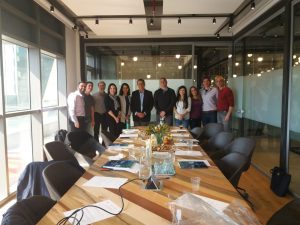
 Growing Opportunity for Israeli Teens at Risk
Growing Opportunity for Israeli Teens at Risk
For teenagers at-risk who live in our Partnership cities of Yokneam and Megiddo, the world of high tech is literally at their doorstep, and yet without the right job skills, it can feel inaccessible. Yokneam’s High Tech Park is Israel’s fastest growing startup ecosystem, home to more than 140 tech firms. Now, through a series of innovative partnerships, Federation is providing tech training opportunities for at-risk students, many of whom are Ethiopian. We are determined to make investments in skill-building, mentorship and entrepreneurial skills that can lift them out of poverty and into tech jobs that will change the course of their lives.
Ofir Dubovi, founder and CEO of Open Valley, and a dynamic driver of high tech in the region, is one of our partners in this work. “The world knows Israel as startup nation, but 93% of all startups are based in a 20 kilometer area centered in Tel Aviv,” Ofir says. “I want to extend those borders by focusing on the north of Israel. We’re creating Academies of Innovation that make technology accessible to youth. We work with NGO’s, the IDF, High Schools and the Ministry of Education to train and to teach entrepreneurship and intrapreneurship outside of Tel Aviv.”
Yokneam was founded in 1950, but in 1989 a new mayor, Simon Alfassi, was elected, and the economic structure of Yokneam changed from a centralized dependence on two large factories to a dispersed base of small high-tech companies. As the number and size of the companies grew, Yokneam and the small communities around it began to attract young entrepreneurs and developers who were looking for a less urban alternative to the Tel Aviv area. It now has over 160 high-tech companies and exports of approximately 6 billion US dollars annually.
Craig Kornblum, who chairs Federation’s Global Jewish Peoplehood Committee, has visited the region many times over many years and understands these changes. He sees the possibilities of a tech education partnership and has become a champion for the initiative. “Over the last 25 years Federation supported this community in a traditional way, using a welfare model. Back then we could barely have imagined the growth of high tech in Israel, let alone in Yokneam. What an incredible opportunity it is to leverage existing tech assets and prepare disadvantaged teens to build a better future,” he said.
Eliad Ben Shushan, Yokneam and Megiddo Partnership Manger at the Jewish Agency, emphasizes the potential of the new initiative to connect teens from Atlanta to teens in Israel. “High tech and innovation is a common language shared by teens all around the world. We hope to bring teens to work together on mutual innovative projects, that will shorten the distance between the communities and mainly tell the modern story of Israel, the strong and innovative Israel!”
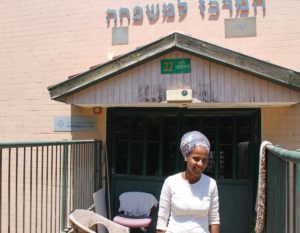
 Empowering Yokneam’s Ethiopian Families
Empowering Yokneam’s Ethiopian Families
 What’s a “typical Jewish family?” PJ Library understands that’s not a simple question. According to Sarah Bernstein, Federation’s Family Impact Associate, “Atlanta’s PJ Library families live ITP and OTP. They come from at least seven different countries, speak many languages, and represent LGBTQ+, interracial and interfaith households.” While free Jewish book subscriptions remain the centerpiece of the program, there’s a growing focus in Atlanta on PJ Library as a community-building tool. Both PJ Library and PJ Baby create community programs that connect young Jewish families, right in their neighborhoods. Ana Rodriguez, who is a PJ Baby Connector in
What’s a “typical Jewish family?” PJ Library understands that’s not a simple question. According to Sarah Bernstein, Federation’s Family Impact Associate, “Atlanta’s PJ Library families live ITP and OTP. They come from at least seven different countries, speak many languages, and represent LGBTQ+, interracial and interfaith households.” While free Jewish book subscriptions remain the centerpiece of the program, there’s a growing focus in Atlanta on PJ Library as a community-building tool. Both PJ Library and PJ Baby create community programs that connect young Jewish families, right in their neighborhoods. Ana Rodriguez, who is a PJ Baby Connector in 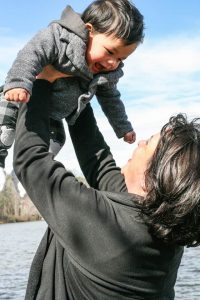
 Discovering A Jewish Life in Atlanta
Discovering A Jewish Life in Atlanta
 Meet Our Russian PJ Library Connectors
Meet Our Russian PJ Library Connectors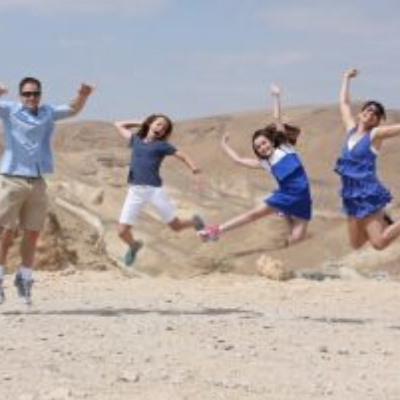
 Taking Family Philanthropy To New Heights
Taking Family Philanthropy To New Heights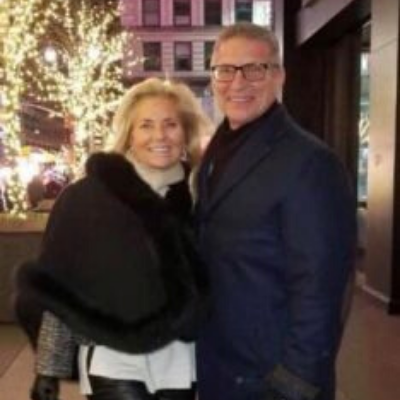
 Lindy lived in Mexico City, Ohio, and Europe before coming to Atlanta. Here she built a successful career selling telecommunications products and only retired two years ago, largely to focus full time on philanthropy and Jewish community building.
Lindy lived in Mexico City, Ohio, and Europe before coming to Atlanta. Here she built a successful career selling telecommunications products and only retired two years ago, largely to focus full time on philanthropy and Jewish community building.
 Sparking Conversations to Leave a Legacy
Sparking Conversations to Leave a Legacy

